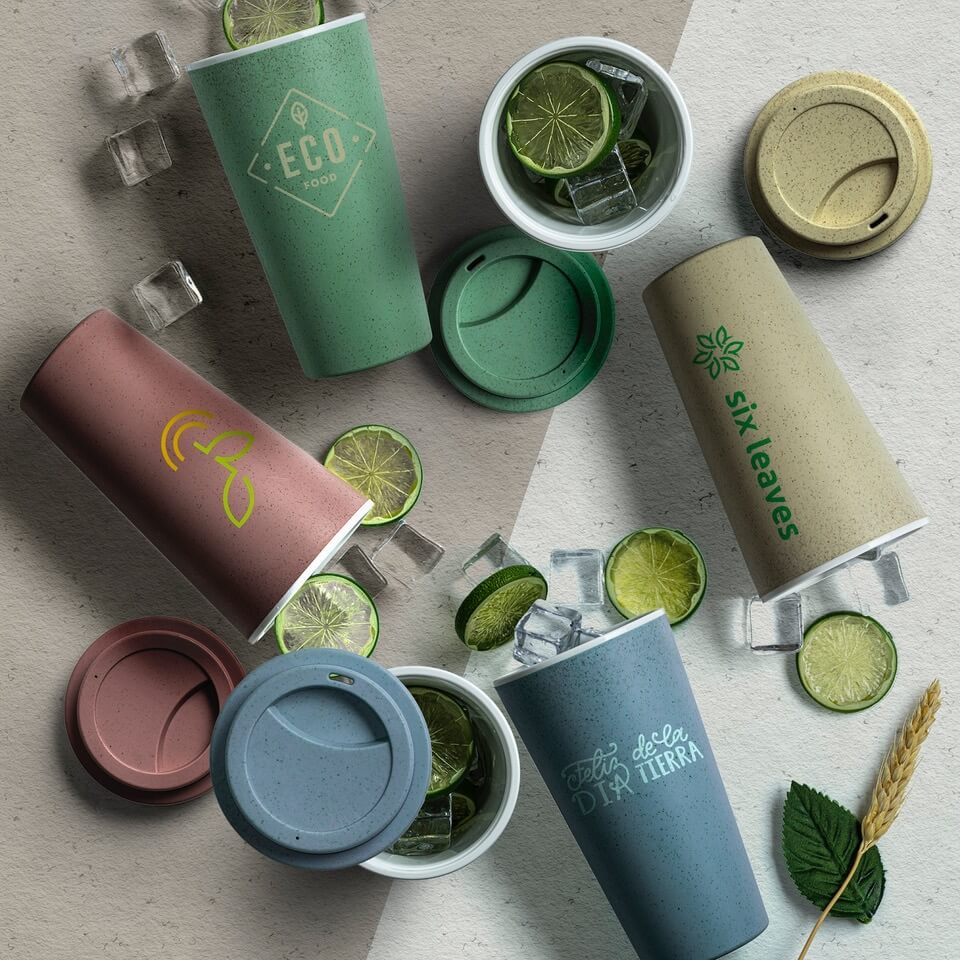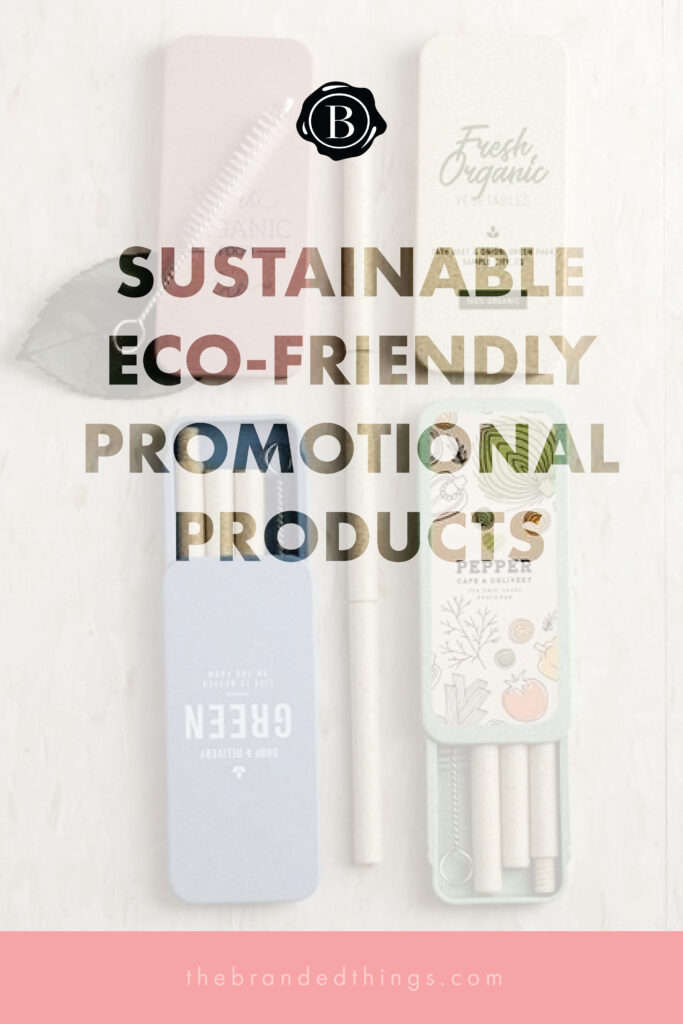Sustainable Eco-Friendly Promotional Products

Let’s say you’re at an open market, or a job fair, or any space where companies are handing out promotional items. At the end of the day, you look in your goody bag and you see… a whole lot of plastic?
Promotional items are a great way to push brands out to consumers, but every brand engagement opportunity also carries risk. Many younger individuals, namely Millennials and Gen Zers, are more environmentally concerned. When these consumers see swag items like plastic pens, water bottles, notebooks, or cheap fabric bags and shirts, their first reaction is either “When will I use this?” or “This is so wasteful!” The result is poor brand perception, a missed opportunity to connect with your customer base, and, yes, a waste of money on something environmentally toxic.
With great branding comes great responsibility, so let’s discuss some options for eco-friendly promotional products that will boost both brands and consumers alike.
Reusable Cups
Today’s consumers are healthier, stronger, and more hydrated than ever, so it’s easy to create appealing branded merchandise through the use of water bottles or cups. However, plastic cups are often redundant: they require a lot more plastic than a disposable cup and so it takes many uses for them to create a positive environmental impact. Additionally, they can still introduce microplastics into the environment, and they often look cheaply made – creating bad brand imagining all around. Cups that are made from ceramics or stainless steel will produce better results: consumers will appreciate their eco-friendliness and think your brand is more high-end, not to mention the amount of plastic you’ve kept from landfills and the ocean. Also included in the sustainable promotional drinkware category are the options of wheat straw mugs and cups. Another eco-friendly habit? Swapping your plastic straw for paper, or toting a reusable stainless steel straw. We've included several eco-friendly promotional product options in our sustainability shop!
Sustainable Fashion
Many companies make shirts part of their promotional material, and for good reason – if someone dons your logo on their chest, thousands of passersby might see it. However, getting them to wear it can prove challenging. Here’s where an eco-friendly wardrobe might help: sustainable clothes can be reworn hundreds of times without tearing or becoming uncomfortable, so higher quality fabrics that are 100% cotton or natural fibers are essential. Synthetic fibers usually release microplastics into the water supply with each wash, and they’re often less sustainable. While a high quality shirt might produce more to cost, the payoff for both your brand and the environment makes up that extra cost.
Some of our favorite brands include recycle material within the garments. Another environmental impact that has nothing to do with recycling and everything to do with sustainability? Sustainable production practices. WRAP-certified facilities (Worldwide Responsible Accredited Production) is a globally recognized, independent 3rd party certifying body whose mission is to promote ethical, humane and lawful conditions and practices in all manufacturing facilities. Companies accepted into the WRAP organization go through an extensive application process in which manufacturing facilities, working environments, and worker's rights are inspected and approved by the WRAP association. WRAP certifications are awarded based upon both internationally and nationally accepted humane workplace standards, local laws, and ethical manufacturing regulations.
We also work with apparel and other promotional products suppliers that are B-Corp certified. That means products produced in certified B-Corp facilities contribute to the highest standards of accountability, transparency, and social and environmental performance.
Goods for Good
Speaking of sustainable production practices, what if the goods you gave supported a great cause or gave back in some way? Shop our Goods that Give Back category in our sustainability shop. Selecting items that support foundations like Wounded Warrior or educational foundations. We also have artisan-made promotional items that mean your dollar goes farther on impact.
Reuse, Reuse, Reuse
Recycled, post-consumer products always succeed over newly produced plastics. Popular products include paper or metal straws, stone paper notebooks, seed paper items, reclaimed wood-based notebook covers, and recycled cloth backpacks. However, thinking outside of the box will guarantee special attention to your brand. When was the last time you saw a nail file made from reclaimed wood, or a tote bag stitched together from recycled nylons? You get the gist – think creative, and consumers will follow.
In every case with promotional products, the idea is to give something that gets reused - whether it's a sustainably made product or not. According to a PPAI study, 81% keep promotional products for more than a year.
It’s in the Bag
Plastic bags create a strain on the environment, which is why many grocery stores have initiatives to reward reusable bags. A tote or cotton-based grocery bag with succinct branding can do wonders for the environment, keeping plastic bags out of circulation while pushing your eco-conscious brand to customers everywhere.
Caring for both your customers and the environment should be a core value for any effective brand. With eco-consciousness a growing concern among younger consumers, and durable, reusable options plentiful for promotional materials, there’s no reason not to invest a little extra in the environment. Your brand will thank you!
Looking to push eco-friendly promotional products to your potential customers? Look no further, Branded specializes in bringing your creative vision to life. Learn more about our process, or book a call today.
What We Do
In our office, we keep sustainability top of mind when it comes to our business practices. We monitor our electric usage, we print as little as possible to reduce our paper consumption (check out the Rocketbook in our sustainability shop!).
We also give back to our local community by supporting local non-profits and business growth initiatives in our community. In 2021, we have a renewed commitment to do more towards the U.N. Sustainable Development Goals.

